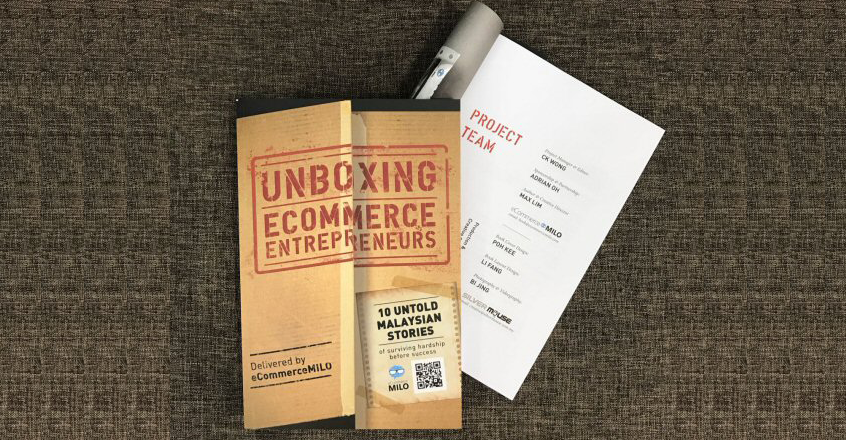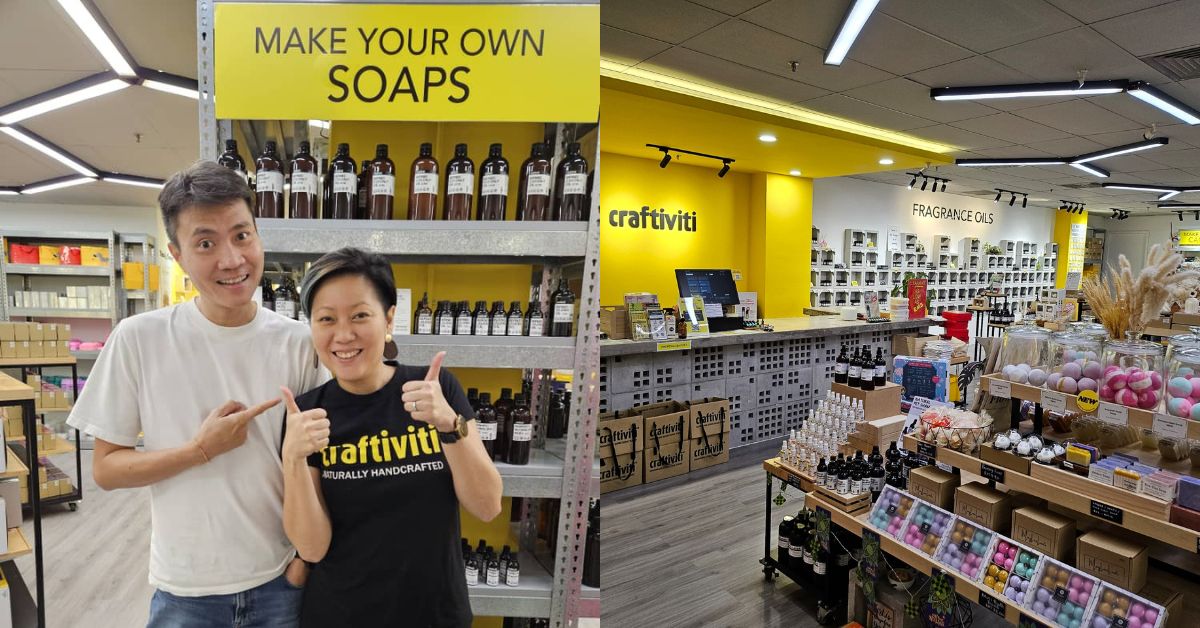It seems like going with the times is too mainstream these days. Online media site eCommerceMILO decided to buck the trend of the usual media progression route and is now looking into publishing a physical book in 2017 after their long years of publishing online.
Founder CK Wong is both the editor and project manager for their newest offline venture, Unboxing eCommerce Entrepreneurs. Projected to reach bookstore shelves sometime early 2017, an ebook version is currently available on the website here.
CK personally finds many interesting stories over his time covering eCommerce on their platform. In his own words, “We realised many of these stories are untold, which we personally find it interesting as opposed to those startup ‘PR stunts’.”
The team worked hard to publish a more informal take on the eCommerce entrepreneur scene, resulting in the book.
We got our hands on it, and here are some highlights from each entrepreneur that we think had shed some light on the eCommerce industry.
1. LittleWiz Anticipated The Market And Jumped In Early

Apparently they were already doing eCommerce before it was mainstream, so the growth rate of eCommerce in Malaysia has definitely benefited them once the industry actually kicked into high gear.
“We were already taking loans (paying instalments), so we had to start with minimal operating cost, I remember buying a secondhand 486 computer (Intel 80486, or commonly known as just four eight-six) to operate the business.”
“Our business is growing gradually and steadily over the years, but it had certainly helped build trust (for) when Streamyx broadband (by Telekom Malaysia) started to gain popularity.”
While there is no way to turn back time and start before this age of eCommerce saturation, being able to anticipate the market’s movement and doing it before everyone else is certainly one way to stay ahead in the game.
2. BookCafe Has Insights Into Spending On Digital Advertising

The obvious answer is of course, you need a little bit of both in order to get that brand spanking new business out there, but what is the ratio? Arief of BookCafe thinks that “Sometimes digital advertising is like heroin, you get what you pay for. But if you cut down the budget, sales go down.”
He added that it’s about keeping up the advertising spend and hoping to squeeze more from the investment by optimisation.
Over the years, digital advertising grows more and more complex, and BookCafe thinks that by now it is best to actually leave it up to the experts.
So what about traditional publications?
“SMEs cannot afford TV, radio or print advertisement, so we spend on Google and Facebook, all money goes to them. Local media, newspapers, magazines, publishers do not get (as) much.”
I certainly see the stark difference between this and a more traditional platform, but does everyone else agree? Perhaps this is something to dwell on.
3. Sherlyn of Twenty3 Listens To Others

Sherlyn started out in Groupon (Then GroupMe) before she ventured into her own eCommerce platform, having gained experience and confidence from her time in her previous company.
She eventually decided to pursue her own brand of eCommerce specially for fashion. She never forgot her roots however, as Unboxing Entrepreneurs notes. She still occasionally gets advice from her former colleagues.
While not all of us can have our own Joel Neoh (of Groupon and now of KFIT) a dial away, it is important to seek advice from others about our own business on top of our own experience.
Twenty3 also apparently enjoys a high conversion rate, with stats showing that 76% of her clientele are return customers. Sherlyn attributes this to the continuous improvement on the product quality, style
and range, but the question is then; how?
“We did a couple of surveys, both online and offline, but we realise that offline (in-store) is the fastest way to get feedback from our customers,” she explained.
4. Tradeworks Believes In Doing Things Well

There are many shoppers who enjoy the eCommerce market due to the sheer variety of products offered, and some eCommerce businesses try to cater to this by trying to offer everything under the sun.
While that’s one way to do it, Eu Gin of Tradeworks thinks that there’s a more efficient equation that they can add to the table.
“Instead of being a pure middleman and competing on prices, traders should focus on a vertical niche and develop a deep understanding of the products they are selling.We are not selling everything, but we have our own approach to keep expanding our verticals.”
“He shared that different kind of product works differently on a different platform, adding that sometimes customers prefer to buy high-value items locally because of the warranty and return coverage,” said eCommerceMILO.
Besides that, he also thinks that there is always room for improvement in how you do your business.
5. Koo From Ookas Focuses On Getting That Click In The First Place

During eCommerceMILO’s interview, they noted how busy Koo was as he believes in getting the product to a customer as fast as possible, even at their expense. But they are doing something right, because as of now Ookas is currently profitable.
But before the sale reaches the point of shipment in the first place, some eCommerce entrepreneurs struggle in getting a click on their product in the first place.
According to the book, “If you are a novice seller, head over to Ookas’ store and learn from them how up-selling and cross-selling should be done. How you can stand out from the product listing and competitions is the product’s thumbnail and price, make full use of them.”
6. ILOVEHOME’s Employs Foreign Seller Strategies In The Malaysian Market

Having studied in China himself before starting up his own eCommerce shop on 11street, Goh took Taobao’s modus operandi and incorporated them into his business. One of the factors that he competes with is price.
“I don’t mind selling with lower profit margin and translate the savings to consumers. I just need to sell by volume, while at the same time optimising the operating cost,” Goh said, as part of what he applied to his business from his China days.
But the word ‘China’ may leave a sour taste in some eCommerce shop’s mouths. Unboxing Entrepreneurs even noted that some felt the “potential threat of China sellers “intruding” local e-marketplaces.”
At this, Goh said, “I learn from my prior experience running a proxy shopping business, the speed is not there. Local
sellers like us, we have ready stocks, and we can facilitate returns or exchanges easier.”
In that, perhaps there is some benefit in selling higher-value items in order to compete with foreign sellers. It may not explode immediately, but with the right marketing and standard operating procedure, it might be a more solid business foundation in the long-run.
7. Lai of Gundam.my Is Not Afraid To Tap Into “Controversial” Markets If There’s A Need

While he primarily focuses on selling Gundams now, Lai started out in eCommerce selling condoms, truly a controversial product in Malaysia. But he was not deterred.
He saw high orders because they were answering a demand no one else was supplying in Malaysia. A condom is a product that is somehow associated with embarrassment and some people prefer to buy them in a way that nobody else can see.
He carries the same philosophy into his Gundam selling, by answering a demand that is not catered to.
“For me, I set 5 criteria to identify the right product to sell online—niche but there’s market demand, good profit margin, recurring sales potential, less online competition and legitimate with reliable source.”
8. Bella Amara Has An Impeccable Marketing Strategy

Perhaps the business with the most interesting content in Unboxing Entrepreneurs, this couple, Carl and Belle, who sell muslimah fashion and even went as far as to name their daughter Bella Amara, like their shop. Theirs is definitely the story to read about how to grow a shop’s social media presence.
Belle has plenty of followers on Facebook and thus they decided to use themselves as mini-influencers, since the potential was already there.
“Whether our products are superior to those of our competitors is subjective, but why we are strong today, it
has to be (credited to) our marketing and branding.”
The marketing strategy? Carl calls it a Guerrilla marketing strategy.
Once, they deleted all the pictures from their Instagram account to stir controversy. “Our followers were wondering what went wrong, asking questions like was our account being hacked? So what was our response? We stayed quiet throughout, and out of curiosity our customers kept coming back, checking our website and channels to find out what was happening.”
While their tactic is certainly not for all businesses, perhaps their outlandish methodology and ideas are something to ponder upon.
9. Hermo Didn’t Just Follow Trends; They Become Trendsetters

As Unboxing Entrepreneur notes, “You might be aware that subsidised discount is becoming a norm with online marketplaces lately, and industry players are talking about same-day delivery. Hermo had done all these a few years
back.”
This is why they are the top beauty site in Malaysia, and continue to be popular among the makeup-lovers in Malaysia.
On top of that, Hermo is not afraid to facilitate full refunds with no questions asked in order to build trust with the buyers. “Our customers can even get a refund after they open the product. We hope with this policy in place, customers could trust us more and share this with their friends (word of mouth).”
10. Photobook Didn’t Forget The Importance of Offline Selling In An Increasingly Online Ecosystem

While keeping things completely on the internet makes perfect sense if one is doing their selling online, Photobook has a different idea in mind.
“We tried many things, including attending wedding expos, travel exhibitions, roadshows, even though our business is considered as online.”
As they were selling something customisable, their photobooks became a hit after potential customers were convinced by what they saw in front of them.
Even after they decided to start selling internationally, they used the same method.
“When we started in Australia, we did some advertising initially but found out that the traditional ways work better. So, we attended wedding expos, contacted professional photographers and sent our products over for them to review.”
Overall, this book was an interesting look into the personal journeys that each entrepreneur took.
There is no one way of setting up an eCommerce business, and this book might just be the push that a prospective entrepreneur needs. They might just see that no matter where they are in their journey, they should at least give their ideas a shot.
Feature Image Credit: book.ecommercemilo.com









